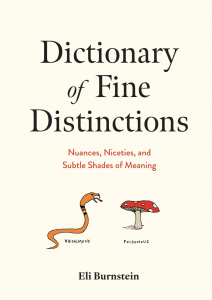Have you ever wondered just why specificity matters? Eli Burnstein is a humor writer whose first book, Dictionary of Fine Distinctions, takes a clever and entertaining look at what differentiates similar sets or pairings of words, and he shares some of his keen insights in this interview:
How did you first become interested in the importance of specificity in language?
I suppose I’ve always been interested in it. But I think reading the great prose stylists nurtured that interest. Folks like Woolf, Nabokov, Pynchon—you read them and can’t help but be bowled over by their word choice. It’s pitch-perfect.

What is the relationship between specificity and effective communication?
Precision writing, to me, is sort of like high-definition TV. The more exact you can be in your choice of words—whether it’s to describe a gesture, a landscape, an emotion, or an idea—the closer you bring the reader to what you’re describing. It’s a big part, I feel, of what we mean when we call a piece of writing “vivid.”
How do granular-level distinctions enhance the clarity of our writing?
Studying fine distinctions can be a useful exercise in sharpening our vocabularies. What’s the difference between a bay and a gulf? A kink and a fetish? An emoji and an emoticon? Mastering these subtleties—and cultivating an appreciation for nuance more broadly—can help train your ear as a writer. It helps you land, not on the almost-right word, but on the word that truly captures your meaning.
Can you explain how specificity is also linked to brevity?
Good question. I think a common pitfall in writing is the tendency to repeat ourselves, and I suspect that we’re tempted to do so whenever we don’t quite “get it right” the first time: we circle back and try to hit our target on the second go-around. Naturally, this creates a bit of bloat. Good word choice is one of the ways to offset that temptation. When you’re accurate, there’s no need for that second, third, or fourth sentence. You got it right the first time. It’s the same with adjectives and adverbs. Though valuable in countless situations, these parts of speech are all too often relied on as correctives to poorly selected nouns and verbs and can make your writing feel padded. Pick the right nouns and verbs in the first place and you don’t need so many helpers.
Do we ever risk alienating our audience by using too fine a lexical selection?
It depends on what we mean by “fine.” I don’t think you can ever be too accurate in your word choice, but I do think you can be too specific. “Elm” might be a more vivid choice than “tree,” but do we need to go all the way to “slippery elm”? Maybe, maybe not. You have to balance specificity against the other virtues of writing, like pace and readability. You have to pick your moments. In my experience, however, the more common error is not being specific enough. Writing can all too easily sag into generalities. Did your character simply “run”? That’s a bit flat. Maybe they darted instead, or loped, or bounded, or galloped. These all mean slightly different things. Which is it?
Do you think an author’s writing skills contribute to their ability to become increasingly
specific?
I suspect that most writers, as they develop, are increasingly attuned to word choice. Good diction is just one virtue among others, mind you—but yeah, I’d agree that as a writer gets “better,” one of the things they’re doing is, to put it bluntly, picking better words.
Apart from your own book, which reference materials would you recommend to those who’d like to learn more?
Merriam-Webster’s Dictionary of Synonyms is a great big reference work for those who want to learn about the differences between similar words (as opposed to just seeing those words listed side-by-side, as with a typical thesaurus).
For our final question, do you have a favorite set or list of distinctions that’s included in your
book? Or one that was particularly interesting to research?
Maze vs. Labyrinth was a really fun one to learn about. I mean, who knew!?
To hear more on this topic, please listen to Eli’s interview on the Writing and Editing podcast (an episode that has become a favorite with listeners!).

